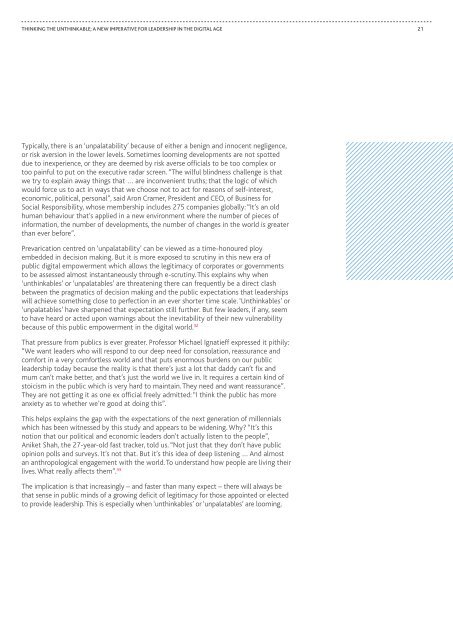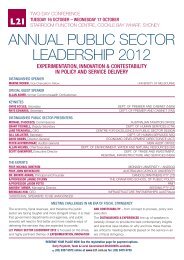Thinking the Unthinkable
Thinking-the-Unthinkable-cima-report
Thinking-the-Unthinkable-cima-report
You also want an ePaper? Increase the reach of your titles
YUMPU automatically turns print PDFs into web optimized ePapers that Google loves.
THINKING THE UNTHINKABLE; A NEW IMPERATIVE FOR LEADERSHIP IN THE DIGITAL AGE<br />
21<br />
Typically, <strong>the</strong>re is an ‘unpalatability’ because of ei<strong>the</strong>r a benign and innocent negligence,<br />
or risk aversion in <strong>the</strong> lower levels. Sometimes looming developments are not spotted<br />
due to inexperience, or <strong>the</strong>y are deemed by risk averse officials to be too complex or<br />
too painful to put on <strong>the</strong> executive radar screen. “The wilful blindness challenge is that<br />
we try to explain away things that … are inconvenient truths; that <strong>the</strong> logic of which<br />
would force us to act in ways that we choose not to act for reasons of self-interest,<br />
economic, political, personal”, said Aron Cramer, President and CEO, of Business for<br />
Social Responsibility, whose membership includes 275 companies globally: “It’s an old<br />
human behaviour that’s applied in a new environment where <strong>the</strong> number of pieces of<br />
information, <strong>the</strong> number of developments, <strong>the</strong> number of changes in <strong>the</strong> world is greater<br />
than ever before”.<br />
Prevarication centred on ‘unpalatability’ can be viewed as a time-honoured ploy<br />
embedded in decision making. But it is more exposed to scrutiny in this new era of<br />
public digital empowerment which allows <strong>the</strong> legitimacy of corporates or governments<br />
to be assessed almost instantaneously through e-scrutiny. This explains why when<br />
‘unthinkables’ or ‘unpalatables’ are threatening <strong>the</strong>re can frequently be a direct clash<br />
between <strong>the</strong> pragmatics of decision making and <strong>the</strong> public expectations that leaderships<br />
will achieve something close to perfection in an ever shorter time scale. ‘<strong>Unthinkable</strong>s’ or<br />
‘unpalatables’ have sharpened that expectation still fur<strong>the</strong>r. But few leaders, if any, seem<br />
to have heard or acted upon warnings about <strong>the</strong> inevitability of <strong>the</strong>ir new vulnerability<br />
because of this public empowerment in <strong>the</strong> digital world. 32<br />
That pressure from publics is ever greater. Professor Michael Ignatieff expressed it pithily:<br />
“We want leaders who will respond to our deep need for consolation, reassurance and<br />
comfort in a very comfortless world and that puts enormous burdens on our public<br />
leadership today because <strong>the</strong> reality is that <strong>the</strong>re’s just a lot that daddy can’t fix and<br />
mum can’t make better, and that’s just <strong>the</strong> world we live in. It requires a certain kind of<br />
stoicism in <strong>the</strong> public which is very hard to maintain. They need and want reassurance”.<br />
They are not getting it as one ex official freely admitted: “I think <strong>the</strong> public has more<br />
anxiety as to whe<strong>the</strong>r we’re good at doing this”.<br />
This helps explains <strong>the</strong> gap with <strong>the</strong> expectations of <strong>the</strong> next generation of millennials<br />
which has been witnessed by this study and appears to be widening. Why? “It’s this<br />
notion that our political and economic leaders don’t actually listen to <strong>the</strong> people”,<br />
Aniket Shah, <strong>the</strong> 27-year-old fast tracker, told us. “Not just that <strong>the</strong>y don’t have public<br />
opinion polls and surveys. It’s not that. But it’s this idea of deep listening … And almost<br />
an anthropological engagement with <strong>the</strong> world. To understand how people are living <strong>the</strong>ir<br />
lives. What really affects <strong>the</strong>m”. 33<br />
The implication is that increasingly – and faster than many expect – <strong>the</strong>re will always be<br />
that sense in public minds of a growing deficit of legitimacy for those appointed or elected<br />
to provide leadership. This is especially when ‘unthinkables’ or ‘unpalatables’ are looming.



